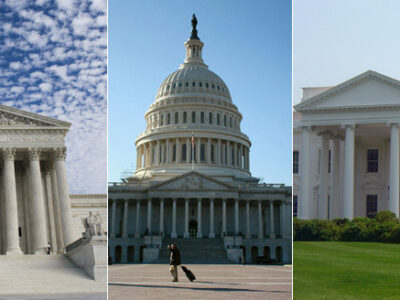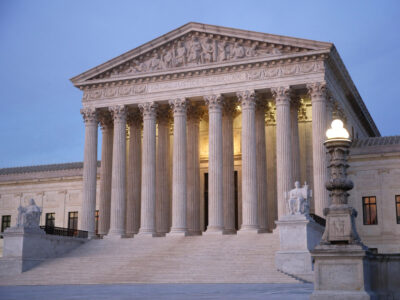judicial review
Environmental Rollbacks: Will the Trump Administration Overplay Its Hand?
The odds are good that Trump agencies will go too far out on a limb.
The Trump Administration’s tendency to rely on bold legal arguments rather than detailed technical ones is a disadvantage in court. Courts defer to agencies on factual matters, especially those that involve technical expertise. Now that Chevron has been overruled, however, legal arguments by agencies don’t get the same deference. Thus, the chances of a judicial reversal are higher when the agency relies on purely legal grounds.
CONTINUE READINGCorroding the Separation of Environmental Powers
“Who decides?” is the first question to ask about a policy issue. Trump’s answer is “me.”
Biden took actions that federal courts ruled exceeded statutory authority, raised separation of powers issues, or threatened federalism. The difference is that Trump has used brute-force attacks on agencies plus extortion against states rather than taking overt legal actions that courts can review.
CONTINUE READINGThe Downsides of Ping Pong Governance
Judicial review, by moderating policy swings, may be important to facilitating long-term investment
I’ve written about debates over permitting reform and other versions of regulatory streamlining to support the development of infrastructure that we need to address climate change. Another view, well articulated by Nicholas Bagley at University of Michigan, is that the problem is more fundamental: Excessive focus on governmental procedures and process, reinforced by searching judicial …
Continue reading “The Downsides of Ping Pong Governance”
CONTINUE READINGWhat to Expect When You’re Expecting Trump: Looking Ahead to 2025
Before even taking office, Trump has confirmed that “normality” is out the window.
Trump’s strategy involves appointing inexperienced administrators and to alienate or eliminate the experienced public servants who could help them implement their policies effectively.The good news is that Trump has not learned the lessons of his first administration and continues to think that ideology and bravado can substitute for competence. The courts are likely to tell him otherwise.
CONTINUE READINGUnderstanding Loper: Delegation & Discretion
Something similar to Chevron deference may still apply to many (most?) regulations.
The Supreme Court took away Chevron deference, but it also recognized that Congress can give agencies the power to clarify statutes and fill in gaps.
CONTINUE READINGJudicial Review After Loper Bright
We used to have the Chevron test? What test do we have now?
Loper Bright has created a new two-part test for courts to apply when an agency has interpreted a statute. It’s not the same as Chevron, but it does have some family resemblance.
CONTINUE READINGIs the Sky Falling? Chevron, Loper Bright, and Judicial Deference
Perplexed? Worried? Here’s a guide to a fraught area of law.
If you’re confused about the Supreme Court’s ruling, you’re not alone. Scholars will be discussing the recent ruling for years. It clearly will limit the leeway that agencies have to interpret statutes, meaning less flexibility to deal with new problems. But unlike many commentators, I don’t think the sky is falling. I was teaching environmental …
Continue reading “Is the Sky Falling? Chevron, Loper Bright, and Judicial Deference”
CONTINUE READINGChevron Gets the Headlines, But State Farm May Be More Important
The abortion pill case could undermine the authority of agency’s expert judgments.
The Chevron doctrine requires judges to defer to an agency’s interpretation of a statute if that interpretation is reasonable. The State Farm case, which is much less widely known, requires courts to defer to an agency’s expert judgment unless its reasoning has ignored contrary evidence or has a logical hole. As you probably already know, …
Continue reading “Chevron Gets the Headlines, But State Farm May Be More Important”
CONTINUE READINGThe New Particulate Standard and the Courts
The tough new air quality standard is sure to be challenged in court. Winning the challenges will be tougher.
EPA has just issued a rule tightening the air quality standard for PM2.5 — the tiny particles most dangerous to health — from an annual average of 12 μg/m³ (micrograms per cubic meter) down to 9 μg/m³. EPA estimates that, by the time the rule goes into effect in 2032, it will avoid 4500 premature …
Continue reading “The New Particulate Standard and the Courts”
CONTINUE READINGInterstate Pollution and the Supreme Court’s “Shadow Docket”
The Court considers whether to stay an EPA plan in light of changed circumstances.
Later this month, the Supreme Court will hear oral argument about whether to stay a plan issued by EPA to limit upwind states from creating ozone pollution that impacts other states. As I wrote before the Court decided to hear the arguments, the issues here seem less than earthshaking, and for that matter, less than …
Continue reading “Interstate Pollution and the Supreme Court’s “Shadow Docket””
CONTINUE READING







